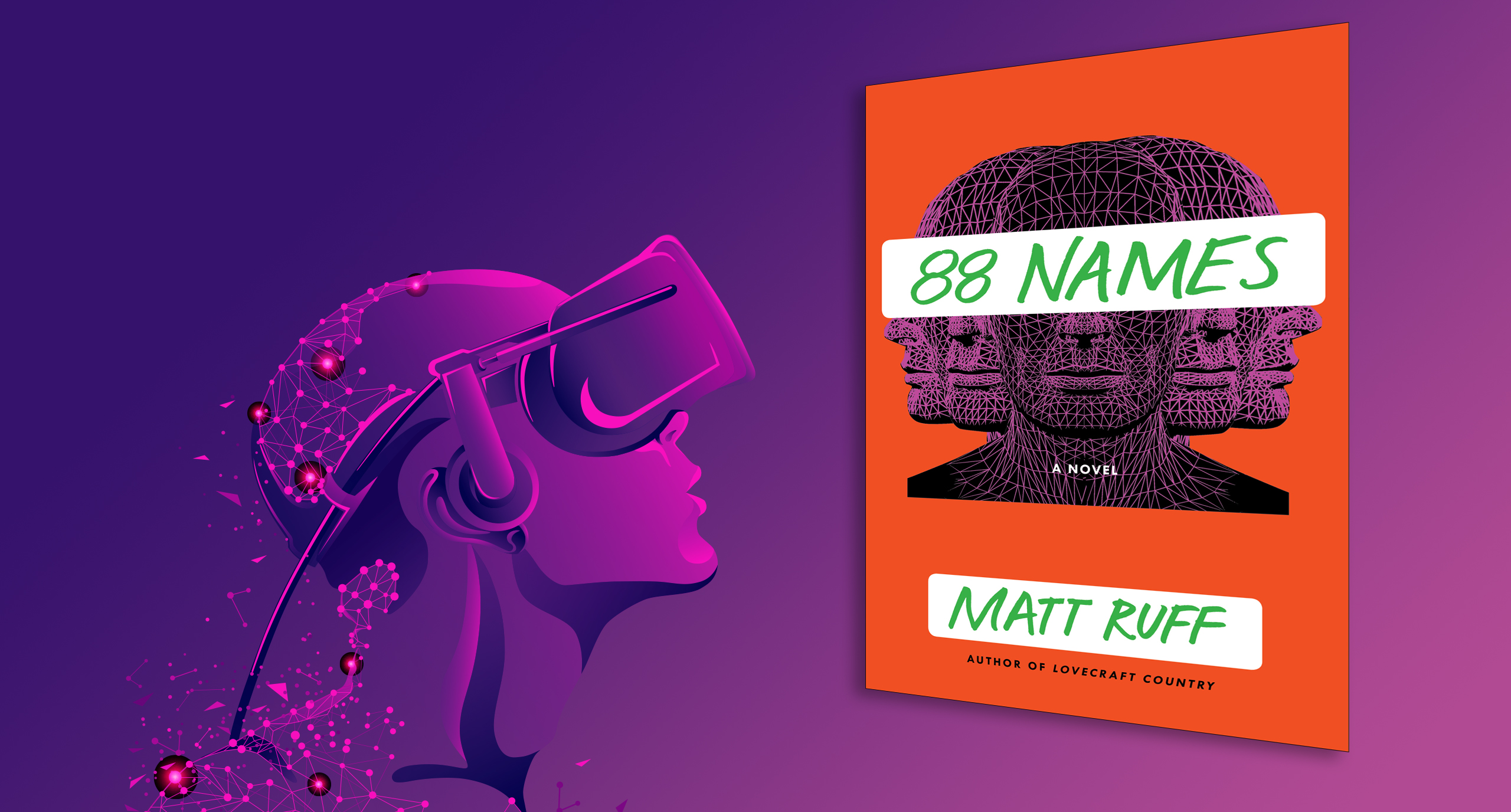
88 Names: Some Final Thoughts
It wasn’t supposed to happen this way.
When Blake Collier approached me with the idea of doing a podcast in conjunction with the publication of 88 Names, it was meant to be an addition to the traditional book tour, not a replacement for it. Most of the interviews were recorded before COVID-19 was declared a global pandemic. With the exception of the special quarantine episode, the only reference to the virus I can recall came during our conversation with Mariana Acuña Acosta. In response to a question about nightmare scenarios, she told us that VR headsets are a great vector for disease transmission, especially at electronics trade shows where hundreds of people may share the same pair of sweat-stained goggles. But the phrase that stuck with me from that exchange wasn’t “coronavirus outbreak,” it was “ocular herpes.”
Towards the end of February, I heard a news report about a cluster of COVID-19 cases at a nursing home in Kirkland, less than twenty miles from my home in Seattle. Because of the proximity, I paid more attention than I otherwise might have. Additional reports soon followed, of new cases with no direct connection to the nursing home, suggesting that the virus was spreading through the community. I paid a lot of attention to that, but even so, my reaction strikes me as naïve in hindsight—I believed I could pick and choose which parts of my upcoming book tour to cancel. “The signing session at Emerald City Comic Con isn’t worth the risk,” I remember thinking, “and we should postpone the out-of-state events for a few weeks, until this blows over, but the local bookstore appearances can probably still go forward.”
Spoiler alert: they did not go forward. Within a matter of days, it became clear that there would be no in-person events in the near future. But when my editor, Jennifer Brehl, called to console me about my lost book tour, I was able to tell her not to worry. While other authors with new novels to sell were scrambling to get themselves online, I was already there. The podcast was ready to go, and I had a bunch of other events lined up as well. Some of these, like my virtual book reading in AltspaceVR, had been arranged by the podcast’s hard-working producer, Darryl A. Armstrong; others, like my guest appearance as a talking monkey on the Drax Files Radio Hour, were a result of my having written a novel about virtual reality. For once in my life, I was ahead of the curve. This was luck, not prescience. All I can claim credit for is having the sense to say yes to cool ideas suggested to me by other people.
Now, as I write this, we are nearly two months into a lockdown I once thought would last a few weeks. The big question on everyone’s mind, after “When will this end?” is “What will the world be like when it does?” In the tech realm, where my own attention has been focused, people wonder how much of the current interest in remote technology will persist beyond the crisis. Is working from home a temporary adaptation, or will it become the new normal?
Having already proved to be a terrible prophet, I should probably cut my losses and keep my mouth shut, but what the heck, I’m stuck indoors with nothing else to do. So here’s my take:
In the short term, I think most of the changes to society not directly caused by the virus itself will be the result of powerful people using the virus as an excuse to do things they wanted to do anyway. I have already seen a number of opinion pieces arguing that, in response to the pandemic, the U.S. needs to become more like China. We need broader surveillance, they say, to keep track of the infected, and stronger censorship of the internet to stop “bad” information from spreading. I can see how these ideas might seem sensible if you’ve been in a coma for the past several years, but as someone still capable of forming long-term memories, my instinctive response is: “You think the problem is Donald Trump doesn’t have enough power?”
Power also factors into the question of whether work-from-home will become the new normal. A lot of people aren’t working at all right now, and unemployment is likely to continue to skyrocket as more businesses go under. A year from now, those lucky enough to still have jobs will not be in a position to negotiate the terms of their employment. So as my protagonist John Chu might put it, what matters isn’t what you think about working from home, what matters is what the person signing your paycheck thinks. If they feel that in order to get their money’s worth, they need you to put on clothes and spend several hours a day commuting, that’s what you’ll do—even if the result is that you are less productive.
In the long term, though, power has a way of shifting. Work-from-home may not become a norm, but it has already become a much more widely shared experience. People who prefer it will remember that they do, and their displeasure at being forced back into a daily office grind will be added to the already widespread unhappiness among low-wage “essential workers” for whom telecommuting was never an option. For some smart political predictions about where that might lead, I recommend listening to our episode three podcast guest, Cory Doctorow.
The lockdown is also giving millions of people a crash course in the relative strengths and weaknesses of existing online platforms. In the past two months, I’ve used Skype, Zoom, Google Hangouts, AltspaceVR, Sansar, and Second Life. All of them have their selling points; all of them leave something to be desired.
If I just want to talk to people remotely, Zoom would be my top pick right now. But as podcast guest Noah Nelson points out, Zoom lacks the sense of shared space that virtual reality can provide. Zoom lets you make video calls; VR lets you mingle.
Of course, virtual reality has its own long list of drawbacks. A recurring theme of the podcast is that the technology is not even close to fully baked yet. The current generation of VR goggles are expensive, temperamental, and uncomfortable to wear for long periods, especially over regular glasses. VR also requires a lot of computer processing power, and augmented reality—which might be a better choice for people prone to motion sickness—requires even more.
And there are other, subtler issues. In AltspaceVR, for example, when I speak, you can see my avatar’s lips move, and from time to time it will blink its eyes. But this is digital sleight-of-hand; my VR goggles aren’t capable of reading my true facial expression, and what the computer cannot see it cannot render.
This is a problem where communication is concerned. In a real-world conversation, if you are talking and I want to jump in to make a quick point without totally derailing you, there are non-verbal cues I can use to signal this. These physical cues allow for a natural back-and-forth that is much harder to achieve in virtual reality. In VR, people are constantly talking over each other, and apologizing for it. Or they take turns, which is more polite but also entails a lot of verbal doubling back: “Before we go on, I’d like to comment on something you said a minute ago…”
I am not the first person to notice this. In his novel Snow Crash—published in 1992—Neal Stephenson includes a whole riff about the importance of accurately rendered facial expressions when communicating in cyberspace. But it’s one thing to read about a problem and quite another to experience it for yourself.
I get it, now. All around the world, other people are getting it too. Some of them—tech-savvy people with a lot of time on their hands—are even now coming up with improvements and solutions. And not just for practical reasons, but because it’s in their nature, when they see a cool technology, to try to make it cooler. This would be happening anyway, but the lockdown may act as a force multiplier, accelerating the process.
Not everyone is thrilled about this. My co-host Blake Collier suggests that if anything, we ought to slow down the pace of technological change and spend more time thinking about the possible consequences. I respect his point, but as a storyteller, I am inclined to a selfish and sometimes reckless curiosity. This podcast has shown me that there is much more potential to VR than I had realized—my novel barely scratches the surface. I want to see where it goes, find out what people will do with it as the technology continues to mature.
In real life, none of us gets to see the whole story. The pandemic is a daily reminder of that, too. But I want to see as much as I can. If a side effect of this weird moment we are now living through is that technological progress speeds up a little, I’m OK with that.
And if the fictional future I imagined in 88 Names turns out to be laughably wrong-headed, I’m OK with that, too. If I can’t always be right, I’ll settle for being lucky—and for having good friends with cool ideas to share.
About The Author

Matt Ruff
Matt Ruff is the author of the novels Fool on The Hill (1988), Sewer, Gas & Electric: The Public Works Trilogy (1997), Set This House in Order: A Romance of Souls (2003), Bad Monkeys (2007), The Mirage (2012), and Lovecraft Country (2016).